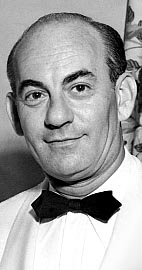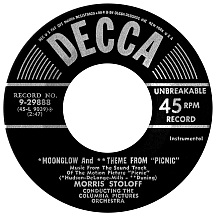MORRIS STOLOFF
Moonglow and Theme from "Picnic"
Two songwriters, a multitude of musicians, another songwriter and two different orchestra leaders all played a role in the creation of a clever and inspired medley, merging the early-'30s standard "Moon Glow" with the mid-'50s theme from the award-winning film Picnic. Will Hudson wrote the instrumental "Moon Glow," first recorded by bandleader Joe Venuti (who gave himself co-songwriting credit) for Melotone and several other labels in the fall of 1933; musician and former movie stuntman Eddie DeLange (who later teamed with Will as The Hudson-DeLange Orchestra) supplied a separate set of lyrics. Its inclusion in the Broadway and London stage revue Blackbirds of 1934 helped establish the song as one of the decade's great hits; clarinetist Benny Goodman's recording of the song for Columbia Records, featuring pianist extraordinaire Teddy Wilson, was a number one hit on July of that year.
A vocal version under the one-word title "Moonglow" appeared that summer by Glen Gray and the Casa Loma Orchestra featuring singer Kenny Sargent. Instrumental jazz versions emerged soon afterwards by Cab Calloway and Duke Ellington (the latter featuring solos by alto saxophonist Johnny Hodges and trumpeter Cootie Williams); these records designated writer credit to Hudson and an associate of his, Irving Mills (an early figure in the jazz world who had a hand in developing the careers of Ellington, Calloway and other greats). Phenomenal jazz diva Ethel Waters put her distinctive stamp on the song and there were many other renditions available on 78s in 1934. Goodman even remade the tune in '36 with an all-star quartet that included Wilson, vibraphonist Lionel Hampton and drummer Gene Krupa.
Morris Stoloff, born in Philadelphia in 1898, became a master of the violin at an early age, performing with the Los Angeles Philharmonic while still in his teens. In 1928, during the early months of Hollywood's sound era, he was hired by Paramount Pictures for the newly-created position of concert master, putting him in charge of coming up with music (used sparingly in films of the day) for the majority of the studio's movie releases. He took a similar, but more secure, position with Columbia Pictures in 1936; as head of the music department he was responsible for composing film music as well as coordinating the works of other composers and musicians, resulting in literally hundreds of motion pictures coming under his supervision and/or featuring his scores. During his 25 years at Columbia he amassed no less than 18 Oscar nominations (ten of them over a span of just six years, 1941 through 1946), the first coming in '37 for a score he did not compose (as the head of Columbia's music department, he shared the nom for Lost Horizon with the film's actual composer, Dimitri Tiomkin).
As for the 17 other films the Academy recognized him for, he collaborated with many talented composers including Gregory Stone, Ernest Toch, Friedrich Hollaender, Louis Gruenberg, Miklos Rozsa and Martin Skiles, occasionally working solo (as on the nominated films You'll Never Get Rich in '41 and Something to Shout About in '43). He won the golden statue three times, first for adapting the score, with Carmen Dragon, for 1944's colorful Cover Girl, the musical starring Gene Kelly and Rita Hayworth with original songs by Jerome Kern and Ira Gershwin. His second Oscar came for The Jolson Story in '46, a film score he claimed to have spent more than 1500 hours working on.

In the late '40s, Stoloff began collaborating with George Duning, a previous arranger for Kay Kyser's "Kollege of Musical Knowledge" and a five time Academy Award nominee in his own right, three of them for films he and Stoloff worked on together. By this time Morris was making records for the Decca label, often putting out singles and albums of popular movie soundtrack music by other composers. He found Duning's score for 1955's widescreen Picnic particularly compelling, as did many; the film, starring William Holden and Kim Novak, was one of the top box office hits of '56 and a Best Picture Oscar contender with six nominations including a nod for Duning's music (it won in the categories of Art Direction/Set Decoration and Film Editing). Stoloff stepped in, working out a jazzy pop medley of the film's love theme released on a Decca single as "Moonglow and Theme from 'Picnic'," credited to Morris Stoloff conducting the Columbia Pictures Orchestra. Duning's original "Theme from 'Picnic'" was on the flip side.
George Cates broke into the biz as a saxophonist for a number of big bands during the '40s and held the enviable position of musical director for Lawrence Welk starting in 1951. He also had a creatively cushy "day job" as a composer, conductor and arranger for Coral Records (counting Welk among its roster), a Decca subsidiary. As soon as he caught wind of what Stoloff and Duning were up to, he put out a less jazzy version of the "Moonglow/Picnic" medley on Coral featuring The Stan Wrightsman Quartet, Chorus and Orchestra, infusing it with coloratura vocal sweetening by Welk's soon-to-be "Champagne Lady" of the '60s and '70s, Norma Zimmer.
Morris Stoloff's "Moonglow and Theme from 'Picnic'" spent three months, from late April to late July, in the national top ten; in June of '56 it was the most-played record on American radio (a number one airplay hit) while on the best seller charts it held down the number two spot for six straight weeks beneath stiff competition from Elvis Presley's breakthrough smash "Heartbreak Hotel" and Gogi Grant's blockbuster "The Wayward Wind." It was the most successful medley in music history until "Aquarius/Let the Sunshine In" by The 5th Dimension ruled the musical landscape 13 years later. For several weeks from May until June, George Cates staked his own claim in the top ten with his recording of the medley; he continued working with Welk on his successful network and syndicated TV series The Lawrence Welk Show until the end of its run in 1982. "Moonglow" and the theme from Picnic, it seems, have since become inseparable. Notable later versions include The Baja Marimba Band's 1964 instrumental and Esther Phillips' 1965 vocal interpretation.
The 1960 film Song Without End brought Stoloff his third Oscar in a collaboration with Harry Sukman; he received one final nomination, also with Sukman, for the dramatic film adaptation of the stage musical Fanny the following year. Morris had hit it off personally with Frank Sinatra when they worked together on the 1957 film Pal Joey; when Frank started Reprise Records a few years later he persuaded Stoloff to join him as musical director for the label, giving him carte blanche to indulge in any side projects he desired. After several more years, Morris Stoloff retired from the business, passing away in 1980 at 81 years of age. Had he needed a resumé to gain employment later in his career, it would certainly be several pages long and astonishingly impressive...not bad for an artist with only one bona fide hit record!


